Podcast: Download (Duration: 38:36 — 35.5MB)
Get Notified Of Future Episodes Apple Podcasts | Spotify | Amazon Music | Android | Blubrry | Gaana | TuneIn | Deezer | Anghami | RSS | More
Episode highlights:
01:50 – Just had to do it
03:49 – BNI and Chamber of Commerce
04:57 – When you’re the speaker
08:07 – How meetups rescued a business
09:15 – Meetups of all sorts
10:29 – One of the best meetups around
13:13 – A direct lead gen platform
17:17 – Trade show tools and tactics
19:45 – Knowledge and connection in one place
21:45 – What conferences did for James
26:49 – How do you get to speak?
29:29 – Paid workshops and running events
34:00 – Where are the events?
Power up your marketing with James as your guide
Transcription:
James: James Schramko here. Welcome back to SuperFastBusiness com, Episode 667. Today I’m chatting with my friend Will Wang. Welcome to the call.
Will: Thanks for having me back, James.
James: Well, we’ve had you back and had you back and had you back. This is actually episode six of our Get Clients Series, which has been a wonderful series in particular, helpful to the business owner looking for more clients, as the name would imply. In the previous episodes, we’ve talked about cold outreach, we’ve talked about emails for cold outreach, we’ve talked about powerful sales conversion process for inbound leads, we’ve talked about lead nurturing and handling objections, and how to diagnose and revive a dead email campaign.
Today, we’re going to talk about how to generate leads from networking and events, which is one of my favorite topics, because I would put attending live events down at as one of the most significant ways my business has grown over the last decade plus, and that is because I got myself on an airplane on numerous occasions and went to other countries. And I met people face to face. And I think this is a topic that is particularly interesting in our market, because we’re in the online marketing world. And I think it’s easy to forget how powerful this can be. And certainly, some people, perhaps yourself, Will, choose the online world because they’re a bit shy, and it’s a way to avoid having to talk to people face to face. So I’m really interested in how you’re going to go with this topic.
Just had to do it
Will: Yeah, it’s really funny because I think it’s one of those topics where I kind of had to do it. Just because, you know, I was starting from scratch; I was a little bit behind where everyone else was in terms of being outgoing and being comfortable talking to people. But funnily enough, the way that I kind of went into the events and offline lead generation, I was actually really bad on the phone, but funnily enough, going to events and talking to people face to face, I was actually more comfortable with. So it’s one of those funny things where, you know, to be honest, looking back at it, I don’t know why it happened, or why I was so uncomfortable being on the phone, or even talking through Zoom and Skype. But the face-to-face stuff was actually where I first got started. So for me, it’s actually an area of comfort, which is kind of funny, because we are from the online world. But yeah, I don’t know, it’s one of those weird things where it just happened by chance and just happened to be how I built the business initially.
James: You certainly look really comfortable up there on stage at SuperFastBusiness Live, and your presentation, I gotta tell you, I’ve been referring people inside the community to that training over and over again, and it’s just unlocking the game for people. They’re ticking the box, they’re finding how they can generate customers using a non-pushy, non-spammy method. So I want to say how much I appreciate that, especially having got the benefit of feedback on it. Let’s kick off with talking about what types of events are out there.
Will: Yeah, cool. So just before that, hey, James, the love is absolutely mutual. So you know, really appreciate being on there as well, and being able to share some of the stuff that we do with the audience and with everyone inside SuperFastBusiness.
So cool, back on the topic. The events that we’re going to be covering today is kind of like a mix of different events that’s really accessible to everyone out there. So we’re going to be covering events like BNI or Chamber of Commerce events; we’ll be looking at meetups, which people can get into; we’ll then cover industry events, like conferences and trade shows, and then paid workshops, and ultimately running your own events, which I actually think you’re going to have more experience talking about than I will, but it’s definitely good to include that as well.
James: Great. Okay, so I guess let’s kick off lead generation, and how it’s different for each of these events, as we get some examples flowing.
BNI and Chamber of Commerce
Will: Yeah, perfect. So let’s start at the very beginning, which s BNI and Chamber of Commerce events. So these were the events that I went to, when I first got started. You know, didn’t have a list, didn’t have an audience, and just needed to go for it and get some leads and also get some clients coming through. Now, the reason that I like these events is because it’s open to the public. These organizations are really about supporting business, and really about getting business people into the room together. And hopefully people come out of it with some leads, with some clients and with some new business.
So the only thing with that is, with these events, you’ve got to be really sure about the type of businesses that you’re actually going after. So for example, BNI and Chamber of Commerce events typically are better for smaller businesses. So businesses with, most of the time, less than 50 staff, let’s say, and they go and learn from each other. BNI especially, you’re kind of forced to be in a room together with each other every single week, typically very early in the morning. And it’s kind of forced networking. So depending on your personality, depending on the way that you like to network or deal with people, that may or may not be a good thing. But you know, it’s a way of getting in the room with business owners if you want to find information about markets really quickly. Or even if you just want to connect and make the online journey, or the journey of running a business, a little bit less lonesome, I guess.
When you’re the speaker
James: My story around this is I never joined one of those groups, but I was on two occasions invited to speak at them. In one of them, I went to North Sydney, is where I actually met my accountant. In fact, not the one I have now, but the guy who owned the agency that my accountant’s at now – his boss, I suppose, at the time, This is many, many years ago, back when I had a job and I was probably making just over $100,000 a year. And as this guy started retiring, his young and upcoming office guy, switched-on guy called Brent took over the reins and eventually bought the business, is the way I understand it. And he does my accounting now. And he’s been with me for the longest time. And I can tell you, that would be since the late 90s. So we’re talking 20 years’ worth of business generated from me attending that one meetup.
And another one I went to was run by my mom in Neutral Bay, and I went and presented a sales training presentation. Again, I still had a job, and I was practicing presenting on the topic of sales training, because I figured I wanted to have my own business, and potentially, I could be a sales trainer. This was before I figured out how to build a website. So there’s a sliding door moment. In fact, it was a sales training workshop that I used off the back of my practice run with the Chamber of Commerce style meeting that I delivered for a financial planner client of mine who paid me $4,000 for a half-day presentation to train his financial planners. I used that $4,000 to buy my laptop, which is what I learned to build my website on. So there’s two stories from the only two meetups I ever went to of that type. And they both turned into very long-term sustainable income streams in a roundabout way.
Will: Nice. So the ROI from those events would have been quite good, then.
James: Well, just my accounting fees alone to prepare for multiple entities, for my lovely accountant over 20 years, would be a huge sum. And you know, he’s earned every penny of it, of course, because our businesses are not like normal businesses. They have their own challenges. And yeah, the compound impact of that. I mean, the compound impact of me buying that laptop and teaching myself how to build a website, there is absolutely no way I’d be sitting here today doing a podcast, Episode 667, if I didn’t buy that laptop, and start trying to figure out how to build a website back in the in the mid 2000s. You know, that was 14 years ago, roundabout 13 or 14 years ago. Yeah, that really was the only two times I’ve spoken and they were several years apart.
“If you’re speaking at these events, you’ve got so much more leverage.”
Will: Yeah. That’s actually a really interesting point, James, that you bring it up, because those are the next thing I was going to say about these events too, because there is a bit of a difference when you’re speaking at these events and attending these events. Obviously, if you’re speaking at these events, you’ve got so much more leverage. And you know, you’ve got the inbuilt authority that people are going to be looking up to you and trying to, obviously, learn from you. So it’s something that we can cover as we go for a little bit deeper as well in terms of you know, how you’re approaching these events, and if you’re going to be speaking or if you’re just going to be attending and networking.
James: Well, my tip for that first one is be the guest speaker. And that’s great positioning, because it worked out great for me.
Let’s talk about meetups. I’m really passionate about this topic, as you know, because that’s where you and I met.
How meetups rescued a business
Will: Yeah, definitely. And meetups for me is, it was one of those turning points in my business that I’ll never forget, because my business kind of grew and turned around. You know, for what felt like the longest time, the business was not doing too well. We were kind of struggling financially. I had left a really high-paying corporate job to try to start the business. And it was actually for a meetup that everything kind of turned around. So what happened was, I was going to all these meetups, specifically around marketing and small businesses. And during the whole time I was building relationships with the people running the meetups, and the people who were attending. But at the same time, the business wasn’t going too well. So what happened was, through one of these meetups, because I’d gone enough times and because I’d contributed awesome questions at these meetups, one day, I turned around and asked one one of the hosts, Hey, I’ve actually got some interesting to present, can I get on stage and share my knowledge with everyone else who comes along regularly? So from that meetup, from presenting at the meetup, I actually picked up some of the biggest clients I had at the time. And you know, I was literally two weeks away from going back to work. And from that meetup, everything turned around. I got the clients that I wanted to get, and that’s how I’ve been able to survive in business and grow the business, from them.
“Build the relationships, and then get on stage and give the value back.”
So yeah, I’ve got a lot of nostalgia and a lot of a lot of gratefulness when it comes to meetups. But the way to definitely approach it is to build the relationships, and then also get on stage and give the value back.
Meetups of all sorts
James: Yeah, so a lot of these meetups can happen in a very informal environment. And then they can have some more formality or presentations. So in the United States, for example, there are themed meetups with guest speakers. They happen on a regular basis. There’s always meetups around large events, like the Traffic and Conversions event in San Diego. Our listeners and good friends, Matt and Joe, they run a meetup at a brewery, of all places. Could you imagine how social that is? I met lots and lots of people the last time I went to that.
I run meetups for SuperFastBusiness members. And when I say I, the members run it. It was a member initiative, a member originally said Hey, let’s meet up. And I said okay, well, you know what? I’ll create a an area in our forum where you can organize that. Her name was Belinda. And she had a meetup, and it was near the Sydney Key. I went to that. It’s about 10 years ago, almost, nine and a half years ago. And we kept doing it. And now we have it at Neutral Bay, of course, in Sydney. But we also have meetups in the UK, and on the west coast of the United States from time to time, and in other countries. Whenever I visit somewhere, we’ll have a meetup, whether it’s Dubai, or Thailand, or anywhere I am, I’ll do a meetup. And we also have them in Brisbane, Melbourne, Perth, and Adelaide.
One of the best meetups around
And it’s just great when members get together, because anyone who’s just joined the community goes to that first meetup, they’re going to be surrounded by other people who speak the same language of online marketing, which to the general public is pretty much alien. You know, let’s face it, if you start talking about Mailshake, and MySQL databases, and DNS and etc, you’re going to get looked at funny. And so it’s a great place to meet people who get you and understand you. And you can actually have a peer-to-peer conversation. And it’s also a great place to exchange information, get best practice, to benchmark, learn of how other people are using resources, get connections. And often there’s no fee, so we don’t charge for them in the SuperFastBusiness members environment. It’s really encouraged for members by members. And we also encourage people to bring a friend, if they want to bring someone who wants to understand what it’s about, because I know those people are going to end up joining SuperFastBusiness, because you couldn’t attend that and not. And as I said, Will, it’s where I remember meeting you up there in the Sydney meetup one time, and it accelerated our friendship from online forum to in-person, and that just evolves at many levels.
Will: Yeah, definitely. SuperFastBusiness meetup is one of the best meetups. I just met the awesome people that you meet there, who are so open and willing to share. It’s just amazing. There’s nothing like it. And that’s a really good thing about meetups. And the other good thing about, you know, just even talking to people in person as well, is, yes, there’s such a great opportunity to learn from each other, to support each other. And just to hang out with the same kind of people who think the same way, that’s definitely the major point, the key point, but it’s also a good place to build partnerships as well. So from going to one of your meetups, actually, James, I’ve been asked to send work around to other people I’ve met there. Other people have referred business into us. It’s just a really good way to get connected and to build those referral partnerships.
James: Well, you know, some of the people I’ve met at the local meetup, like Ilana Wechsler, who’s also got a series on SuperFastBusiness, I’ve watched her grow from not being sure what she wants to do, and then realizing her data analysis background put her in a fantastic position to be doing paid traffic. And she became somewhat of a Facebook and AdWords expert, and started offering services and then coaching other people how to do it. And that, really, I watched that grow from meetup to meetup, get stronger and stronger and more confidence and being able to chat to peers.
It’s kind of like a talk group for adults, where, you know, people want to talk about that. It’s a little bit like a parents’ group, I would say parents’ group these days, where they all have something in common, you know, they’ll have had a baby recently, and they’re all exchanging tips for feeding and nappies and burping and, you know, what sort of car seats and stuff. Like, it’s a community sort of thing with a like theme.
I guess we should have a chat about industry events, because I’m also really connected to this one as well. And I’m sure you have a few stories.
A direct lead gen platform
Will: Yeah. So, industry events, for me, are kind of interesting. I actually break it into two different types. So one of which is trade shows, right? So for example, the accounting industry has a lot of different trade shows, where you’ve got the big software companies going in there, dropping lots of money, and everyone’s got their own little stand, own little booths. And everyone’s just trying to get the traffic through and kind of pitch their wares. So that’s one type. And the other type, which I think you run so well, is events, where it’s kind of like a mixture of a workshop and also an industry event. So maybe what we’ll do is, we’ll talk about the trade shows first, because, for me, that’s more of a direct lead generation platform. And then yeah, look, I’m not as experienced as you in terms of the paid workshop. So it’d be good to get your take on what you think works.
James: Well, you know what, I’ve got a fair bit of experience with trade shows, because we used to do the automotive show every year. And I spent many years, probably from 1995, through for, you know, probably eight years attending motor shows, and it was most definitely about lead capture. Our role was to attend the show, to man the stand, and to talk to prospects about the motor vehicles which were on display, and to capture leads. And we had to put all the leads into the box, and then they would get farmed off to the various dealerships by prime marketing area. So it was geographic-specific.
Now, I’m pretty sure a few sales people here and there would bypass the official system and slip the lead into their pocket, and just follow them up directly, being a bit sneaky. And it’s a bit old school. You know, these days, I coach some fantastic customers who have software that captures at the point, at trade show point leads, and they have things like quiz and they integrate into CRM tools, and you can have competitions, and it’s on an iPad. I wish we had that back then, but we didn’t. So I spent many an hour standing on my feet talking to people who in many cases weren’t necessarily prospects, they were just out to see the latest, greatest cars.
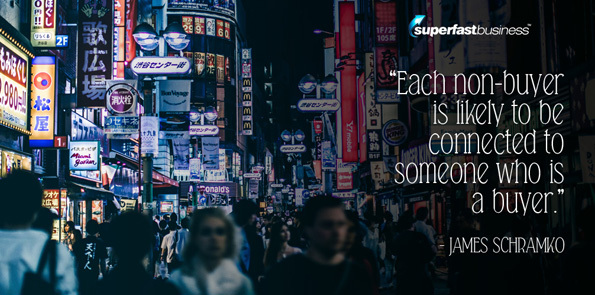 And that’s what trade shows do, they attract people who are interested in seeing what’s happening, and it’s your job to convert them into a customer. But I will say this, I sold a lot of cars from those motor shows because I took it seriously as a lead generation activity. And of course, I knew the secret. And that is, each person, even if they’re not a buyer, is definitely likely to be connected to someone who is a buyer. And if they do buy, they’ll certainly buy again. And then I could talk to them about their family and work peers and generate that repeat referral business.
And that’s what trade shows do, they attract people who are interested in seeing what’s happening, and it’s your job to convert them into a customer. But I will say this, I sold a lot of cars from those motor shows because I took it seriously as a lead generation activity. And of course, I knew the secret. And that is, each person, even if they’re not a buyer, is definitely likely to be connected to someone who is a buyer. And if they do buy, they’ll certainly buy again. And then I could talk to them about their family and work peers and generate that repeat referral business.
So the feeling around it at the time was that it was a bit of a prison sentence that you had to commute. You had to work a full day in the dealership and then go into the Motor Show till 10 at night, and then do the whole thing the next day, or go to the show and then go into the dealership. It was absolutely grueling for the whole period of the show. But I’ve worked the show, and I’ve got an appreciation for the process.
But these days when I hear people like you talking about getting your assistant to look up trade shows online and take a database of all the exhibitors and then to start marketing to them, well, that’s genius. And I thought about that when I went to a baby expo last year. As you know, we had a recent arrival. And I was seeing the difference between the vendors and how they promote, and I came away from that expo with a pram. We found the most incredible pram that travels on an aeroplane, that’s light, and rolls really well but is strong. And they had a great show special. So you can definitely even make sales at trade shows, if you’re an exhibitor. And if you’re trying to sell stuff, and the people at the trade show are your prospect, well, you have them all in one place and they’re captive, and you can literally collect all the details and data of the exhibitors in one hit.
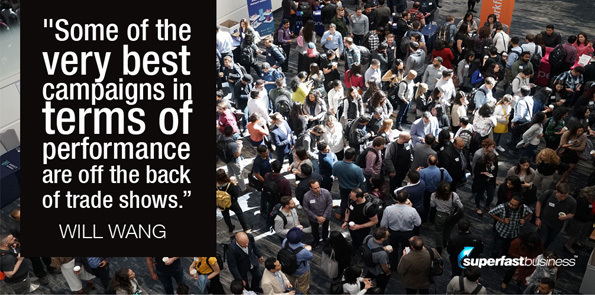 Will: Yeah. I mean, trade shows, both sides when you look at it are actually amazing. So some of the best campaigns that we’ve ever run for our clients are actually off the back of them going to trade shows, purchasing a booth, doing the marketing. Because, you know, with the trade shows, you’ve got just highly qualified buyers. I mean, yes, some of them might not be looking, but as you were saying, they’re connected to people who are interested in the industry, who might know someone who is looking to buy or who is looking for more information. And what you’ve got is, you’ve got your stand there, and there’s thousands of people walking past, some of them even coming up to you and talking to you about what they’re trying to get. So some of the best, very best campaigns in terms of performance are off the back of trade shows.
Will: Yeah. I mean, trade shows, both sides when you look at it are actually amazing. So some of the best campaigns that we’ve ever run for our clients are actually off the back of them going to trade shows, purchasing a booth, doing the marketing. Because, you know, with the trade shows, you’ve got just highly qualified buyers. I mean, yes, some of them might not be looking, but as you were saying, they’re connected to people who are interested in the industry, who might know someone who is looking to buy or who is looking for more information. And what you’ve got is, you’ve got your stand there, and there’s thousands of people walking past, some of them even coming up to you and talking to you about what they’re trying to get. So some of the best, very best campaigns in terms of performance are off the back of trade shows.
Trade show tools and tactics
Now the software that you were talking about is crucial as well, because I’ve been to a few trade shows where the companies have used default software, and it’s just broken down. There’s just no way for them to collect leads. And these companies are paid $50,000, $100,000 to be there, yet they’re letting leads slip by. So it’s really important to make sure you’ve got the right software to actually get information about the leads. And if you can, get more information than just the name and the email, right? So get information about what they’re interested in, what your conversation was about. And then have a follow-up campaign off the back of that, which has already been created. So you don’t want to get back to the office Monday after the trade show, and madly try and remember what everyone that you spoke to was interested in. You just want to have systems ready to go, marketing and emails ready to go off the back of that. And if you do that, it would be a very successful trade show, if you’re purchasing, you know, if you have a stand, and if you’re marketing to people coming into the trade show and attending.
James: Yeah, that’s perfect. And if you are selling, then use all the tools in your toolbox, like the power of demonstration. In fact, recently on a call, someone said they purchased a stall and they want to know how they’re going to collect leads. And I said, put a coffee machine in it. Because if you’ve got the best thing going in that local area, they’re going to swarm to your store. And at Mercedes-Benz, we used to do this thing where if you came to the show stand and you showed your Mercedes badge, then you could go through the little velvet roped area up into the VIP section and have free coffee and drinks and snacks. So you felt special.
Will: Yeah, definitely. And so, just before we move on to the next one, I just I wanted to touch on the other side as well, because you mentioned it in terms of finding out who’s actually got a booth, who’s exhibiting and then finding their details. So with going after bigger corporate and big companies, and I’ve done this for myself, and again, for some of the clients that we work with, these corporate companies have invested a lot of money into getting the trade shows there. You know for a fact that they’re going to be rolling out the VPs or direct sales, and some very senior people. So what we kind of figured out was, well, some of these people, you know, especially if they’ve kind of been forced into the trade shows, they’d rather sit around and have beers or have coffee with everyone coming through. So it was a perfect opportunity to start conversations with the people that we were looking to talk to, that we wouldn’t normally get into just because they’re so busy in their day-to-day life and their day-to-day work. So one thing that we’ve done around trade shows as well is, if you can find the names of the companies exhibiting, look at who you actually want to speak to, it’s really to find who will be in charge, and then book even a five to 10-minute coffee meeting with them, and actually sit down and talk with them at the show. So that’s been a really powerful lead generation strategy we’ve used, especially if you’re specializing in a certain industry.
Knowledge and connection in one place
James: Nice. So what about the conference side of things?
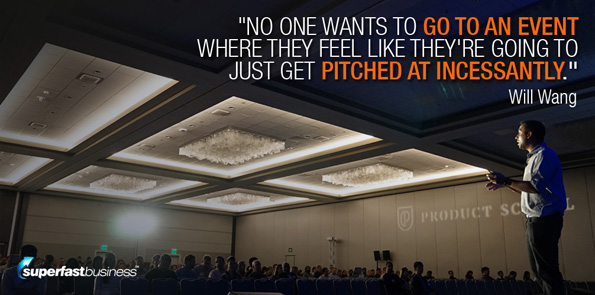 Will: Yeah. So at conferences, and again, I’d love to hear your take on this, James, but for us, conferences are a really good way of kind of going in, having an open mind, learning as much as you can, but also building out networks and building up partnership potential. So with a lot of this, the networking that we’re talking about, and a lot of the face-to-face, it’s not so much directly going into people and just pitching them, because no one wants to go to an event where they feel like they’re going to just get pitched at incessantly. It’s really all about, you know, going in, being in a room of VPs, and really finding out about what other people are doing in the business, but also potential where you can help them. Because if you understand where you can help them, well then they’ll at least like talking to you, and start thinking about how they can help you back. It’s one of the principles that Robert Cialdini talks about in his book. It’s the idea of, you know, helping them first, for them to become a friend. And then when you help them, they’ll think about your business. And that’s how you kind of build a really good referral network that passes leads and clients and just work along to each other.
Will: Yeah. So at conferences, and again, I’d love to hear your take on this, James, but for us, conferences are a really good way of kind of going in, having an open mind, learning as much as you can, but also building out networks and building up partnership potential. So with a lot of this, the networking that we’re talking about, and a lot of the face-to-face, it’s not so much directly going into people and just pitching them, because no one wants to go to an event where they feel like they’re going to just get pitched at incessantly. It’s really all about, you know, going in, being in a room of VPs, and really finding out about what other people are doing in the business, but also potential where you can help them. Because if you understand where you can help them, well then they’ll at least like talking to you, and start thinking about how they can help you back. It’s one of the principles that Robert Cialdini talks about in his book. It’s the idea of, you know, helping them first, for them to become a friend. And then when you help them, they’ll think about your business. And that’s how you kind of build a really good referral network that passes leads and clients and just work along to each other.
James: Yeah, well, you know, like, the conferences is, I don’t know where to start, Will. I’ve talked about this a few times on my show. The first online marketing conference I went to was run by John Giaan. And it was at Homebush, and Mike Filsaime was speaking there. And I still had a job. And that’s where I met a guy who was an underground PPC marketer, and he had a folder there of Perry Marshall’s Definitive Guide to AdWords. And I found out more about that, and I started running AdWords in the dealership after that. I met Mike Filsaime at a dinner, and he gave me confidence that in no time, I’d be making 100,000 a month. And I remember going home feeling like 100 feet tall, being inspired that this guy who’s making hundreds of thousands a month thinks that I’ve got the goods for it based on our conversation. And then fast forward a couple of years later. In fact, that wasn’t the first online. The very first one was even years before that, it was run by John McGraw. And it was about online marketing, but it was super early in the game, and it was just a little bit too early. But that was the first proper one, when I was already doing the online marketing, and I realized I knew a lot of the stuff that people were talking about at that event. That’s where I met people like Dan Dobos, who’s been a regular on the show and spoken at my live events.
What conferences did for James
And then I went across to America in 2008, to Underground 4 by Yanik Silver. It was just me, I didn’t know a single person. I really couldn’t afford the time off work, and it was on my credit card. So I had to make the best of it. And I was exhausted and starving. And they had a competition, and I entered it. And I stayed up all night long, and I built a website and I recorded all my steps and burned it onto a DVD onto my laptop, the one that I bought from doing the sales training presentation a few years prior, and submitted it to the event organizers. I didn’t sleep at all, stayed up the whole night. And turns out, I won it. I jointly won it, this other guy won first prize. And my prize was, I got to become a member of Maverick, which was the millionaires’ online marketers club of Yanik’s, which was I think, at the time, like $10,000 a year to join, and you had to be making a million dollars a year. And I wasn’t quite making a million dollars a year then, I was probably on about 150 grand a year.
And the good news was, the first event was on in six weeks in Las Vegas. And my heart sank because I knew this is just too hard. How am I going to fly home and then fly back six weeks later? Another trip, another annual leave. And I realized, I have to do it. And luckily, I got support for it. My partner said, You’ve got to go. So I went. And there, I met all sorts of people. I saw Mike Filsaime again, but also back then the superheroes of the day like Brad Fallon and Mike Hill, who wasn’t really well known back then as he is now, but he was a huge speaker at the underground event. I implemented everything he told me about cost per view marketing, CPA marketing. And I started helping other people, like Craig Ballantyne, I tuned up his WordPress website. And I helped Mike Geary, I introduced him to his Swiss translator for his German Truth About Abs product. And I started participating in CPA marketing. And then I went out and offered my services as an internet marketing expert to a couple of businesses who I’d built websites for. They both said yes, and I quit my job just a few weeks after getting back from Las Vegas. So that was when I flicked the switch.
This all happened within the space of about eight weeks, from attending the event to quitting my job, it was enough to get me that extra hundred and 50 grand a year. And that was over 10 years ago, and I’ve never looked back. And of course, I’ve kept going back. I went back to America every single year since, pretty much, and one year I went back, I think, 12 times in a year.
And I really put in my time. I’ve built a very, very strong network, which is surely measured by how many happy birthdays I had on Facebook yesterday which is hundreds. But no, seriously, I’ve actually met most of those people face to face. And that’s the differentiator. By going to events like John Carlton‘s events and meeting Bond Halbert, and Jon Benson and speaking at other people’s events as well, Ryan Levesque’s event and Ezra Firestone’s event. All these people I’ve built out. It’s where I met Molly Pittman, I’ve met Pat Flynn. So a lot of the people who have come into my world now. Tom Breeze I met at TNC, and so forth.
So each time I go to an event, if it’s a big one like that, I can usually meet about 115 people. And I’ll have meals, I’ll have discussions. And just like you said, I’m never there to sell anything. I don’t think I’ve ever pitched anything, ever. It’s just not my nature. I’m just there to say hi, to connect, see if I can help. And often people ask me, they might say they read my book. These days, a lot of people say, I listen to your podcast, I love your podcast. It’s mind blowing how many reactions I get to that. So I would say this: if you’re going to go to events, publish, publish, publish, publish, publish, because when you do get there, you’ll actually have people who feel like they know you.
Will: Yeah, I mean, that’s just amazing, isn’t it? Because you know, so far in the series, we’ve talked about direct ways of going out and actually getting leads and clients and how do we measure that in terms of ROI. But sometimes it’s things that you go out there and you’re not expecting a return or not expecting or even wanting a sale that actually gets the best results long term.
 James: That’s the difference between push marketing and pull marketing. And it’s fair to say, in my world, everything comes to me. And the most active thing that I do to go and get it would be to actually turn up to an event, to keep publishing – publish a book, publish an article, publish videos, publish podcasts. That’s my active mode. That’s my forward motion to create the opportunity. And then it comes back at me in a reactive way. So that’s my front-footed motion, is to publish, and to show up at live events. And I’m going back to America again this year to speak at Kevin Rogers’s event, Copy Chief Live. It’s an amazing event. It’s blueprinted off SuperFastBusiness Live in the very beginning, and he runs a sensational event with the very best people. So I will go back every year. And I also go to Europe every year too, as well. And I won’t stop doing it. I spoke in Spain for Mindvalley. If you can speak at events, of course, that is absolute premium positioning. And that’s usually the way that I do it these days.
James: That’s the difference between push marketing and pull marketing. And it’s fair to say, in my world, everything comes to me. And the most active thing that I do to go and get it would be to actually turn up to an event, to keep publishing – publish a book, publish an article, publish videos, publish podcasts. That’s my active mode. That’s my forward motion to create the opportunity. And then it comes back at me in a reactive way. So that’s my front-footed motion, is to publish, and to show up at live events. And I’m going back to America again this year to speak at Kevin Rogers’s event, Copy Chief Live. It’s an amazing event. It’s blueprinted off SuperFastBusiness Live in the very beginning, and he runs a sensational event with the very best people. So I will go back every year. And I also go to Europe every year too, as well. And I won’t stop doing it. I spoke in Spain for Mindvalley. If you can speak at events, of course, that is absolute premium positioning. And that’s usually the way that I do it these days.
Will: Awesome.
How do you get to speak?
James: People ask me, how do you get to speak at events? Well, people will ask you to speak at events if you start publishing. And also a lot of conferences have application processes. You can actually just ask them if they’re looking for speakers, and you can apply. And I’ve had lots of my students speak at Ontrapalooza, Mindvalley type events and digital marketing events, just because they’ve put themselves forward or they’ve had me put them forward.
Will: Yeah, it’s actually great that you say that, because one of the things that we’ve been able to help some clients do is really get clear on what value they bring as a speaker and what their expert topic is, and then kind of to refer back to some of the episodes we did before. But if you know that, and you know what type of event the audience would really like in content or get value out of the content you’ve got, it’s actually pretty easy to reach out and find the person organizing those events, and shoot him an email saying, Hey, I feel like the topic I’ve got will be of value to the people coming along. You know, have you actually got a spot left for me to actually speak? And I think, James, that’s actually how I got to speak at the event that you were running. I believe I sent you an email with a topic that I had in mind. And because we already had a bit of a relationship at that point, and I had been to some of the some of the meet-ups, I think that’s what kind of accelerated and actually got me on stage.
“What is going to move the needle for that audience?”
James: Yeah, that’s perfect. I mean, there’s a whole story around how I got myself on stage and so forth. But again, some of it was actually connected to me going to that event in the US and asking people, you know, what should I sell? And they said, You should sell a workshop, which I know is another topic that we’re going to bring up in a minute. And to sell the workshop, I would found selling from stage was the best. I still speak at events each year, and it’s absolutely critical to understand your audience. The only thing I want to know when I’m speaking at an event, the absolute most critical thing, is what is going to move the needle for that audience? And I will customize my presentation. I’ve spoken at Traffic and Conversions, I’ve spoken at Underground. I’ve spoken at Ecommerce All Stars, spoken at Mindvalley University. I’ve spoken at numerous 35K sort of masterminds, and at ProBlogger, Tropical Think Tank. Whenever I go to the event, I will completely customize my presentation for that audience. Because if you get a room of bloggers, it’s a really different room to a room full of ASK funnel people or a room full of the highest level copywriters in the world, or a room full of ecommerce stores, and they’re going to have different things. And you notice that when I asked you to speak at my event, Will, I did a pre-event survey of people who purchase a ticket to find out their challenges and what they’d most like to ask the speaker, so that I could then give that to the speaker to nail their presentation. And that’s why every presentation was a knock-it-out-of-the-park success because we knew exactly what the audience needed.
Will: Yeah, yeah, definitely, that was super helpful.
James: So, gosh, talk about that all day long. Let’s talk about paid workshops.
Paid workshops and running events
Will: Sure. So, a paid workshop kind of ties into the last one as well, which is running your own event. Obviously, the workshops, for me, the way I kind of look at it, is it could be a multi-day event, but essentially it’s kind of running it and getting the right people that you want to be talking to and potentially will be good clients for you, in getting them in a room and getting them to commit to the act of giving you their attention. And you know, putting something on the line to actually learn from you, or kind of hear from you. Because one of the issues – well, not issues, but one of the challenges of running free events, is that people might not value the information they’re going to be getting, they might not value the fact that they’ve opted in, or they’ve given their details and got a ticket. But paid workshops, especially if you’re running it yourself, is actually a really good medium to get the right and engaged audience.
So for example, when I first started in this online world, one of the best strategies for me was to actually hire a room and reach out to five to 10 people in the industry that I was trying to target. So at that point in time, it was actually accountants. So I would reach out to five to 10 accountants in the local area, and say, Hey, I’m actually putting on a workshop, where you come in, and I’ll pay for breakfast, we’ll get some really nice bacon and egg rolls and coffee. And you’ll get to network with your peers, and I’ll show you what’s actually working in the world of online marketing for accountants. So that was, for me, one of the best lead generation strategies, because I was going into the right market with an offer of value, you know, some kind of value, and then getting them to commit either their time or to pay me a little bit and commit their money to coming along to these events.
James: Perfect. So you’ve created the forum where you have a captive audience of the perfect target, and you’re able to give them some edutainment in a way they can continue to get help from you, I imagine.
Will: Yeah, yeah, exactly right. And then ultimately, the goal of that is to find out who actually wants to work with us down the line. But I’ve seen this, and it’s not necessarily just for the marketing world, either. I’ve seen this work in the health space, I’ve seen these work in the baby space as well. It’s really about having an event that gives value back to the people that are coming along, and then having some kind of offer or some kind of value that you can provide ongoing, if they’re a good fit, and if they like what you have to say during the event.
James: Yeah. So an example of that, even with my own event, I ran a campaign for people who came to the event who were not members of SuperFastBusiness membership. And I followed them up with an offer to become members, and I had a huge amount of them, take me up on that offer and become members. So it’s the perfect way to continue the relationship, to be able to share the recordings, to help them on their journey as a business owner.
I also find people who come to my Maldives mastermind, after a week of hanging out on the boat with me and the others become lifelong friends. They also rebook for the next year, typically, and they consume many of my other products and services. So they’re almost always a member of SuperFastBusiness or SilverCircle. And most of them come to SuperFastBusiness Live as well. So they will be interested in most products or services that I have.
And I used to run a thing called a SilverCircle intensive, which was a smaller workshop just for SilverCircle members. And I’d get between two and five people at my house for two days. And I run about five or six of those. And again, those people have a much higher retention.
It’s like the stats from Amazon Prime, where people who buy Amazon Prime memberships spend a lot more than the average customer. I think it’s twice as much. Anyway, I’ve been on Amazon Prime recently, mostly to access a show that I was interested in watching. And it’s only very cheap per year – it’s like 50-something dollars a year. And I just bought my kid some books and they ship it like, really quickly. Like the next day. It’s really fast. So I imagine it’s easy to spend money with Amazon because of that, inside a membership.
“If you have a couple of people who have already had success, then you have an in-person case study or testimonial that you can utilize.”
So having a way that you can set up an event and get people to come to that, to be able to get to know them, it melts away a lot of the online things like trust and proof, because you’re actually able to get people a result. They’re able to see you and know that you’re legit. They can also speak to as many other people as you want. I mean, literally at a workshop like that, if you have a couple of people who have already had success, then you have an in-person case study or testimonial that you can utilize.
Will: Yeah, that’s super powerful, especially for being able to break down the leads. Because a lot of the workshops that we go to, especially in the online space, there’s a lot of doubt, and there’s a lot of people that they’re not sharing information the right way, or just making bold claims that may not necessarily be true. So if you go to an event that you’ve run, and you’ve got successful clients and clients who, you know, just don’t know your services, it’s such a great way of breaking down that trust area and building the authority at the same time.
James: Perfect.
Whoo, lots of good ideas here. Let’s see. So what else would you like to know regarding the workshops or events that maybe we haven’t touched on? I suppose we should find out how to know where these things are.
Where are the events?
Will: Yeah. So knowing where the events are would be good. And there’s this new tool that, you know, I’m not sure people have heard about. It’s fairly low-key. It’s called Google. Obviously, a bad joke, but Google is the best place to find out about events like this. So if there’s a particular industry that you’re after, you can always just Google, for example, accounting conference, accounting event, or marketing conference, marketing event. If you’re on some other platforms, like Meetup or Eventbrite, they’ve all got search functions in them. Facebook groups are a great place to go to find out about things coming up that might not necessarily be advertised as heavily. But honestly, there’s more events, than you know, than you can poke a stick at. There’s so many different opportunities out there for us to go and not even just go out and find clients, but to learn about industry, connect with people who are similar, and just build relationships.
“There’s more events than you can poke a stick at.”
James: You know, I’ve always thought that was a strange expression, to poke a stick at. And then these days, though, when I go shopping in the Philippines, they do literally have a stick and they poke at the things in your bag, just have a look around the bag to see that you’re not taking things that you shouldn’t inside the shopping center as you go through the metal detector. So maybe the expression came from that, I’m not sure the origin of it.
Also, if you’re a member of SuperFastBusiness, the meetups are published inside there. And we encourage you to come to them, if you haven’t. If you’re wondering about it, if you were shy, maybe this episode’s helping you be inspired to start a meetup in your local area. But definitely go to them. And go to the ones that hinged off the back of bigger conferences. Almost all the big conferences these days will have events, parties, and so forth. They might be disguised. At the minimum, make sure you go to the bar, because that’s where everyone socializes and starts and then heads off to other events. And most of the big trade suppliers, software companies like Ontraport, for example, will have their own customer appreciation event, because they want to do the same thing, they want to reestablish and strengthen the relationship with their audience who are going to be at the big event anyway.
I’ll be speaking at the DigitalMarketer event in Australia later this year, it’s going to be in August, and I’m sure there’ll be meetups around that as well, as there was last year.
So Will, you’ve been a knowledge bomb, of course, and I love how you’re helping your clients, especially clients who have a bit of budget and are looking to tap into these things. Perhaps someone listening to this has a company that wants to be running these events. I’m sure you could probably help them organize those and to help them capture those leads and nurture them and do all the magic you do to them.
Will: Yeah, yeah, definitely can. I absolutely love events. events are some of the some of the best ways that I’ve seen with the campaigns we run for our clients. Some of the best results have come from events. So I absolutely love them, you know, both for myself and for my client. So if anyone wants more information about it, how we run them, and the nurturing we do off the back, I’m more than happy to share that information as well.
James: Great. How do we get in touch with you, Will?
Will: Yep, so the best thing to do would be to head across to the website, which is growthlabz.com, and use the contact form. Or otherwise, shoot us an email at [email protected].
James: Thank you so much. Well, this has been a wonderful episode. We have more like this at The Get Client Series on SuperFastBusiness.com. We also, these days, publish these onto our YouTube channel at SuperFastBusiness and our Facebook page, SuperFastBusiness. You can catch it even on Spotify. So there’s no excuse. Get out to these events.
I have to say, this has been a fun topic for me, because everything we’ve talked about has been an absolute critical turning point for me in my online career. I just want to emphasize how much of an important factor this is in the growth and acceleration of your business. You’ve got to meet people face to face. And the more you prepared to do it (and it is counterintuitive for an online business), the stronger the relationships.
That’s how I met most of my high-level coaching clients. And that’s why I’ve been able to stay with the market for so long, because I’m connected to the pulse and the energy of the market through actual, real life friendships and relationships that have come from running events, attending events. Doing all those hard years on the tradeshow floor certainly probably helped my ability to communicate. So I encourage you to get out there, do it.
Will, it’s been amazing. Thank you so much.
Will: It’s always fun. Thanks, James.
Join the network of business experts inside JamesSchramko membership
Generate quality leads your business needs with help from Growth Labz
Enjoyed the show? Leave us a review on iTunes
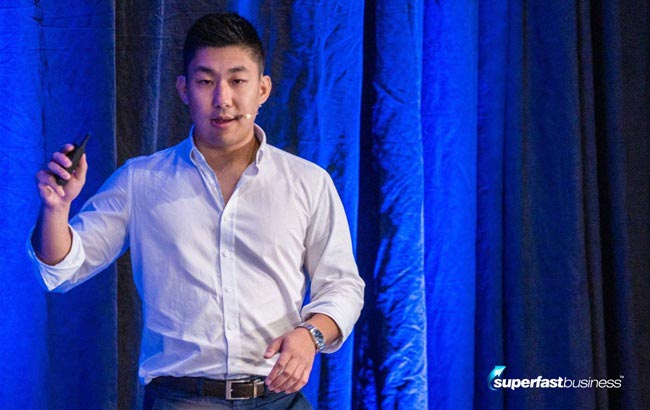
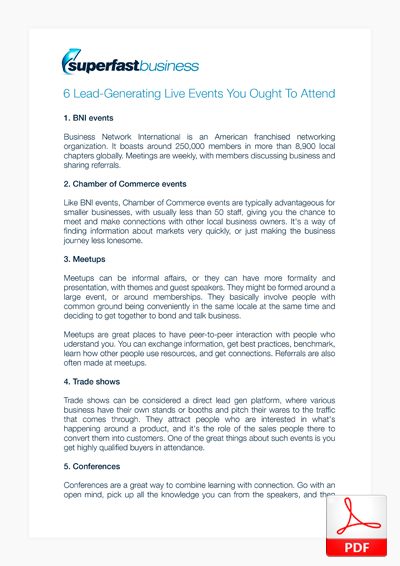









Leave a Reply